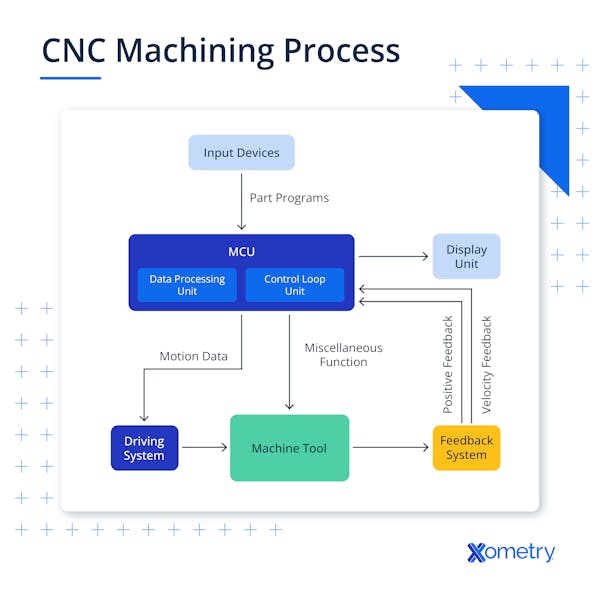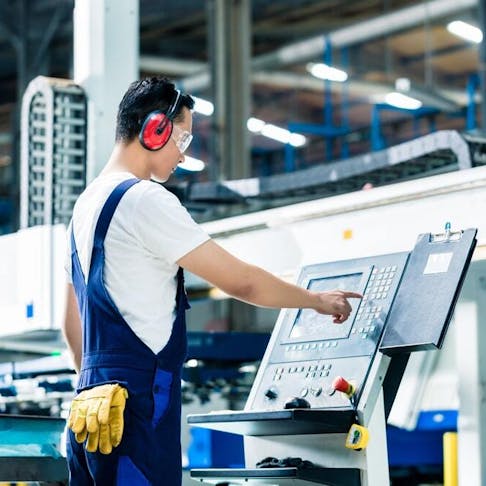What is a CNC Machinist? A CNC machinist uses computer software programs to create operating instructions for computer numerical controlled precision machinery such as presses, drills, and lathes. They are also called CNC operators or CNC machine operators.
This article explores the role of CNC machinists: professionals who program and operate computer-controlled precision machines such as drills, lathes, and mills.
What Is a CNC Machinist?
A CNC machinist uses blueprints, sketches, or computer-aided design (CAD) and manufacturing files to produce precision parts. CNC machinists set up and operate various CNC machines to manufacture precision parts efficiently and accurately. Their responsibilities vary by industry but generally include machine setup, operation, and quality control.
What Are the Roles of a CNC Machinist?
CNC machinists are responsible for operating and maintaining CNC machines, reviewing parts for accuracy against CAD models, and adjusting machine settings to ensure quality production. A CNC machinist’s responsibilities include reviewing samples, drawings, or instructions to understand the specifications for the machine output, taking measurements and marking material for cutting or shaping, and planning the sequence of necessary actions for completing a job. Their other roles include selecting appropriate machines and their positions needed for a given job, loading material for that job, determining and programming the size of batches and the machine speed needed, and monitoring machines while they are in operation to adjust the feed, maintain proper temperature, and identify any issues that may need correction.
CNC machinist responsibilities also include inspecting finished parts to ensure they meet specifications, discarding defective outputs, maintaining accurate production records, and performing routine or corrective maintenance on machines as needed.
What Skills Do CNC Machinists Require?
A CNC machinist is required to be proficient in all aspects of CNC machining, including milling, turning, close tolerance manufacturing, and more. Familiarity with CAD/CAM software is beneficial, especially for machinists who also perform programming tasks. They should have the ability to use precision tools for Quality Control and Metrology (such as calipers), be able to take accurate measurements, have knowledge of the properties of metal and other materials, and possess the ability to read blueprints, schematics, and manuals.
CNC machinists should have strong math skills for interpreting blueprints and performing precise measurements, along with the physical stamina to handle raw materials and tooling.
What Are the Necessary Personality Traits for CNC Machinists?
CNC machinists should enjoy working with computers. They should enjoy the challenge of troubleshooting when things go wrong. CNC machinists should be detail-oriented since they are usually producing parts with tight tolerances where even fractions of a millimeter count. They should have a passion for creating things and be effective at time management.
CNC machinists should also possess good problem-solving skills and the ability to adapt quickly to changing conditions. CNC machining is a highly automated process, but automation does not guarantee problem-free production. There will always be things that need to be adjusted or unforeseen issues that will arise. CNC machinists should also be team players since they will work closely with design engineers, plant managers, and Quality Control specialists.
I've observed that the most successful CNC machinists, myself included, are individuals who are extremely detail-oriented and possess excellent problem-solving skills. We also need to be cool-headed when facing pressure and approach challenges with a creative mindset.Jason McClureVP, Manufacturing Operations
How To Become a CNC Machinist
The requirements for becoming a CNC machinist vary depending on the employer. However, in most cases, a high school diploma or GED (General Educational Development) is required to become a CNC machinist.
In addition, machinists will need to complete some formal training, whether on the job or through a specialized trade school training program.
CNC operator positions are often taken by those just starting out in the industry. The length of time to become an operator depends on the employer and how much experience they require. Some complete on-the-job training after high school, while others start in operator positions after completing a CNC machining training program.
How Much Can a CNC Machinist Earn?
As of 2025, the average annual salary for a CNC machinist in the United States is approximately $50,600, with entry-level positions starting around $42,900 and experienced professionals earning up to $63,000.
What Factors Influence a CNC Machinist’s Salary?
Experience, location, education, company size, market, and industry are all factors that influence a CNC machinist’s salary.
Where Do CNC Machinists Receive the Highest Pay?
As of 2025, CNC machinists in Hawaii earn the highest average salary at $68,250, followed by Delaware and Maryland, each averaging around $58,500.
Where Can a CNC Machinist Work?
CNC machinists can work in machine shops or manufacturing facilities. They work in industries such as aerospace, automotive, medical device manufacturing, electronics, and fabricated metal product manufacturing. Producers of custom parts or products have a need for CNC machinists as the nature of that business involves frequent changes to production runs for customers that have different requirements.
Are Math Skills Required to Be a Good CNC Machinist?
Yes, math skills are essential for CNC machinists. Interpreting blueprints, calculating dimensions and tolerances, and programming CNC machines require proficiency in basic arithmetic, algebra, geometry, and trigonometry. In addition, using measurement and metrology tools requires mathematical skills to ensure that the parts being machined are accurate to the drawing or CAD model design.
Does Xometry Help With a CNC Machinist's Job Tasks?
Yes, Xometry helps with a CNC machinist’s job tasks. Xometry is a leading provider of custom CNC machining services for rapid prototyping and production parts. Our massive partner network means that whatever your part, we have a shop and a machine that can make it. We integrate seamlessly with over 3,000 vetted manufacturing partners in the US, including ITAR-qualified facilities, and we are ISO 9001:2015, AS9100D, and CMMC Level 2 certified.
What Is the Difference Between a CNC Machinist and a CNC Operator?
In some organizations, there is not much of a difference between the role of a CNC machinist and a CNC operator, and the terms are sometimes used interchangeably. However, it is generally accepted that a CNC operator is usually more of an entry-level position in a company. CNC operators stock materials and run parts. They confirm specific directions that are followed to create an end product that meets the required specifications. CNC operators set up and operate CNC machines and equipment. An operator may unload raw materials, prepare a test run to ensure a machine is working properly, and inspect and measure finished products to ensure they meet requirements. Essentially, the difference between a CNC machinist and a CNC operator is that the operator does prep work and post-work, while the machinist does the actual machining.
The role of a CNC machinist is more advanced than that of an operator. Machinists can accurately machine parts to print using a variety of machines and methods. They rely on their skills and expertise, often obtained through an accredited trade school or many years of on-the-job experience.
Many machinists start as operators and work their way up into this role. This is because the CNC industry is very complex, and machinists must first master basic machine operations before taking on more advanced responsibilities.

Is a Bachelor’s Degree Required To Become a CNC Machinist?
A bachelor’s degree is not required to become a CNC machinist. Most employers require a high school diploma or GED, along with vocational training or completion of a certificate program in CNC machining.
Is a License Required To Be a CNC Machinist?
State licensing is generally not required to be a CNC machinist. However, industry-recognized certifications such as those from the National Institute for Metalworking Skills (NIMS) can improve employability and demonstrate proficiency. In addition, many individual workplaces may require CNC machinists to be licensed on their machines in order to ensure a safe workplace.
Summary
This article reviewed the role of a CNC Machinist and described the education, skills, and traits needed to succeed in this position.
Xometry provides a wide range of manufacturing capabilities, including CNC Machining and other value-added services for all of your prototyping and production needs. Visit our website to learn more or to request a free, no-obligation quote.
Disclaimer
The content appearing on this webpage is for informational purposes only. Xometry makes no representation or warranty of any kind, be it expressed or implied, as to the accuracy, completeness, or validity of the information. Any performance parameters, geometric tolerances, specific design features, quality and types of materials, or processes should not be inferred to represent what will be delivered by third-party suppliers or manufacturers through Xometry’s network. Buyers seeking quotes for parts are responsible for defining the specific requirements for those parts. Please refer to our terms and conditions for more information.


